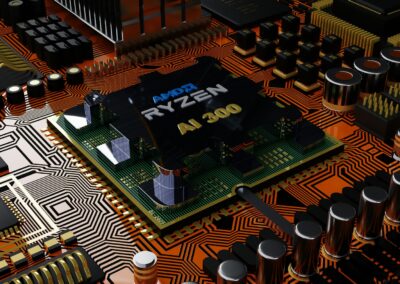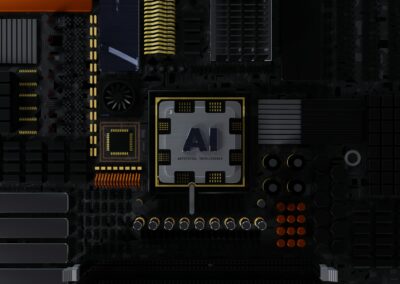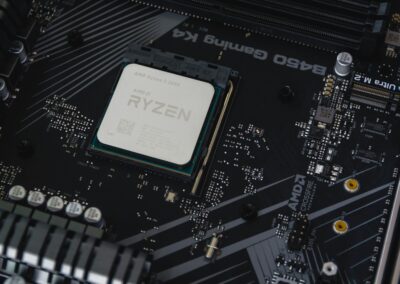Unlocking the Power of Cognitive and Edge Computing
Introduction to Cognitive and Edge Computing
The integration of cognitive computing with edge computing represents a significant leap forward in the field of modern technology. Cognitive computing, which involves the simulation of human thought processes through advanced AI algorithms, combined with edge computing, which processes data near the source rather than in a centralized data center, offers transformative potential for various industries. This powerful combination enables real-time data processing and analysis, enhancing decision-making capabilities and operational efficiency.
In the context of rapidly developing regions such as Saudi Arabia and the UAE, the adoption of these technologies can drive substantial economic growth and innovation. These countries have already made significant investments in AI and modern technology, aiming to diversify their economies and reduce their dependence on oil. By integrating cognitive and edge computing, they can further enhance their technological infrastructure, paving the way for smarter cities, more efficient industries, and improved public services.
Cognitive computing’s ability to learn and adapt from data, combined with edge computing’s low-latency processing, provides a robust framework for tackling complex problems in real-time. This synergy is particularly beneficial in industries such as healthcare, finance, manufacturing, and transportation, where timely and accurate data processing is critical. The implications for business success and leadership in these regions are profound, as companies can leverage these technologies to stay ahead of industry trends and drive sustainable growth.
Transforming Industries with Cognitive and Edge Computing
The potential of combining cognitive computing with edge computing is already evident in several key industries. In healthcare, for example, cognitive systems can analyze patient data in real-time to provide personalized treatment recommendations, predict potential health issues, and support clinical decision-making. Edge computing ensures that this data processing occurs swiftly, reducing latency and enabling immediate responses in critical situations. This can improve patient outcomes and streamline healthcare delivery, particularly in regions like Riyadh and Dubai, where advanced healthcare services are a priority.
In the financial sector, cognitive and edge computing can enhance fraud detection and risk management. By processing transaction data at the edge, financial institutions can identify and respond to fraudulent activities in real-time, protecting assets and maintaining customer trust. Additionally, cognitive algorithms can analyze market trends and customer behavior, providing valuable insights for strategic decision-making and personalized financial services. This is crucial for maintaining a competitive edge in the fast-paced financial markets of Saudi Arabia and the UAE.
Manufacturing is another industry poised for transformation through these technologies. Edge computing allows for real-time monitoring and maintenance of industrial equipment, reducing downtime and increasing productivity. Cognitive computing can optimize supply chain operations by predicting demand and identifying inefficiencies. Together, these technologies enable a more agile and responsive manufacturing process, which is essential for meeting the growing demands of global markets. For the industrial sectors in Riyadh and Dubai, this means greater efficiency and competitiveness on the world stage.
Enhancing Business Success with Cognitive and Edge Computing
The integration of cognitive computing with edge computing offers numerous benefits for business success. Companies that adopt these technologies can achieve greater operational efficiency, improved decision-making, and enhanced customer experiences. By processing data at the source, businesses can reduce latency and improve the speed of their operations, leading to faster and more accurate outcomes.
Leadership and management skills are also enhanced through these technologies. Cognitive computing provides executives with real-time insights into market trends, operational performance, and customer preferences, enabling them to make informed strategic decisions. Edge computing supports this by ensuring that data is processed and analyzed quickly, providing up-to-date information that is crucial for agile leadership. This combination fosters a culture of continuous improvement and innovation, which is essential for thriving in today’s competitive business environment.
For entrepreneurs in Saudi Arabia and the UAE, the adoption of cognitive and edge computing can drive innovation and growth. These technologies enable startups to leverage advanced data processing capabilities, allowing them to develop new products and services that meet the evolving needs of their customers. By staying at the forefront of technological advancements, these entrepreneurs can position themselves as leaders in their respective industries, driving economic growth and creating new opportunities for their communities.
The Future Potential and Challenges
Exploring Future Applications and Benefits
The future potential of combining cognitive computing with edge computing is vast and varied. As these technologies continue to evolve, their applications will expand across different sectors, driving further innovation and efficiency. In smart cities, for instance, cognitive and edge computing can be used to manage traffic, monitor environmental conditions, and enhance public safety. By processing data in real-time at the edge, city officials can respond quickly to changing conditions, improving the quality of life for residents.
In the retail sector, these technologies can provide personalized shopping experiences by analyzing customer behavior and preferences in real-time. Retailers can use this information to tailor promotions and recommendations, enhancing customer satisfaction and loyalty. This level of personalization is becoming increasingly important in competitive markets like Riyadh and Dubai, where consumers expect high levels of service and convenience.
Moreover, the integration of cognitive and edge computing in the energy sector can lead to more efficient and sustainable energy management. By analyzing data from various sources, such as smart grids and renewable energy systems, these technologies can optimize energy distribution and consumption. This not only reduces costs but also supports the transition to more sustainable energy practices, which is a key priority for Saudi Arabia and the UAE as they seek to diversify their energy portfolios.
Addressing Challenges in Implementation
While the benefits of combining cognitive computing with edge computing are clear, there are several challenges that must be addressed to fully realize their potential. One major challenge is the need for robust data security and privacy measures. As data is processed at the edge, it is crucial to ensure that sensitive information is protected from cyber threats. Companies must invest in advanced security protocols and technologies to safeguard their data and maintain customer trust.
Another challenge is the need for skilled professionals who can develop, implement, and manage these technologies. This requires significant investment in education and training to ensure that the workforce is equipped with the necessary skills and knowledge. Saudi Arabia and the UAE are already making strides in this area, with initiatives aimed at developing local talent and fostering a culture of innovation.
Finally, the ethical implications of these technologies must be considered. As cognitive systems become more autonomous, it is important to establish guidelines and frameworks that ensure their use aligns with ethical standards and societal values. This includes addressing issues such as bias in AI algorithms, transparency in decision-making processes, and the impact of automation on employment.
Conclusion: Embracing the Future of Cognitive and Edge Computing
The combination of cognitive computing with edge computing holds immense potential for revolutionizing industries and driving technological advancements. By leveraging the power of these technologies, businesses can enhance their decision-making capabilities, improve operational efficiency, and deliver superior customer experiences. For regions like Saudi Arabia and the UAE, the adoption of these technologies can drive economic growth and innovation, positioning them as leaders in the global market.
As we look to the future, it is essential to address the challenges associated with these technologies and ensure their development aligns with ethical standards and societal values. By investing in education and training, implementing robust security measures, and establishing ethical guidelines, we can harness the full potential of cognitive and edge computing to create a smarter, more efficient, and sustainable future.
—
#CognitiveComputing #EdgeComputing #RealTimeProcessing #DataAnalysis #TechnologicalAdvancements #SaudiArabia #UAE #Riyadh #Dubai #BusinessSuccess #AI






























